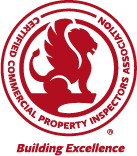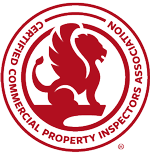This two-day, in-person class will help you take your commercial property inspection business to the next level. In a series of lectures and class discussions, students will learn about cost estimating and reporting through a deeper understanding of building maintenance. The student will walk away with a trained eye for identifying and communicating property conditions and the recommended methods for dealing with them.
This class aims to help commercial property inspectors be both an immediate and ongoing asset to their clients by assisting them in planning sound capital management of their property assets. Cost estimating and a knowledge of building maintenance are great value-adds to your existing inspection services, as well as a powerful pathway to long-term client retention. Prior commercial property inspection experience is recommended.
This class will focus on and hone the commercial property inspector’s skills through two main topics: cost estimating and building maintenance, and building systems and applications.
Cost Estimating and Building Maintenance
This first session will familiarize the student with practical methods for cost estimating and reporting on maintenance and repair issues. These methods help students go beyond defect recognition, applying them to their client’s transaction viability, capital management, and value preservation of a building.
We will also review how to market your cost-estimating services and building maintenance expertise to gain clients and repeat business. Additional topics include reactive maintenance, predictive maintenance, and cost differentials.
Note: Cost estimating is also referred to as “cost to cure” and “opinions of probable costs.”
Building System and Component Applications
This second session takes a look at common material defects and maintenance issues for the property grounds, exterior, roof, structure, plumbing, HVAC, and interior, in addition to specific building types, such as public access buildings, manufacturing facilities, multi-family properties, hotels and motels, newer buildings, older buildings, etc. This session will prepare the student for a variety of situations and conditions in found during a commercial inspection.
Class Dates & Registration for Boulder, CO Training
Class Date: March 23-24, 2023 (from 8 a.m. to 4 p.m. each day)
Venue: InterNACHI® Headquarters & House of Horrors I (Boulder, CO 80301 United States)
Cost:
CCPIA members: $1,200.00
Non-members: $1,450.00
Use code COST2CURE for 20% off.
The class size is limited to 24 students, so reserve your spot now! Breakfast, lunch, snacks, and beverages are provided. Deals for nearby hotels are below.
Hotel Deals & Additional Information
Please visit nachi.org/school/visiting-boulder for directions and nearby accommodations.
The class is a series of lectures and class discussions. We cannot provide a copy of our PowerPoint slides, but you will receive handouts containing relevant class materials.
Be sure to bring your preferred note-taking materials. Laptops are permitted. Breakfast, lunch, snacks and beverages will be provided.
This class will be led by Scott Harris, CMI®. He has 35+ years of international engineering, construction, and inspection experience. He’s a licensed home inspector, general contractor, and certified commercial property inspector. He’s also a Level III Thermography Consultant. Harris is the owner-operator of Property Exam Corp., and can give you real-life guidance for entering the commercial sector of the inspection industry. Harris is also an experienced educator and has taught training classes for FLIR to real estate professionals. He is the author of “Commercial Property Maintenance.”
Students will receive a Certificate of Completion for completing this class. It is approved for InterNACHI® and ICC continuing education. Upon successful completion, students will be able to:
- Implement business strategies to better compete in the commercial inspection industry, improve your safety, and reduce your liability.
- Take inventory of building systems and components and determine if a specialty consultant is needed for a more in-depth assessment.
- Effectively work with specialty consultants and communicate your findings with your clients.

